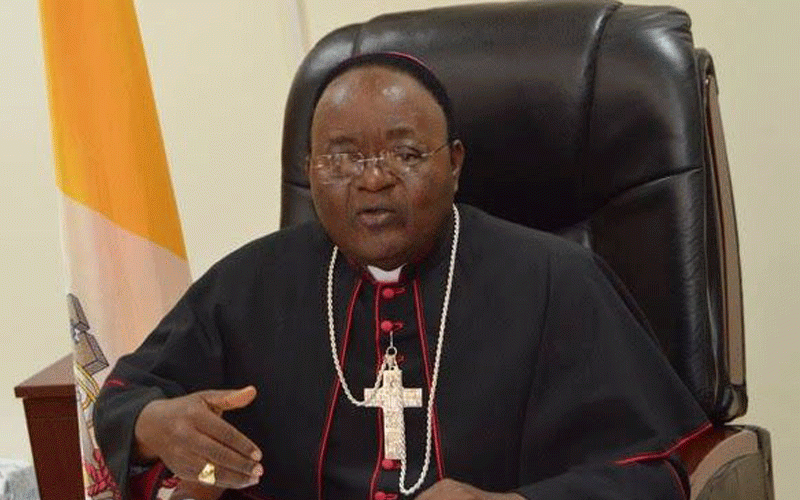Dans ce qui pourrait être considéré comme une démarche controversée, l’archevêque de Kampala en Ouganda, a publié un décret interdisant la réception de la Sainte Communion dans la main afin de promouvoir le respect de l’Eucharistie et de mettre fin aux «abus».
« Désormais, il est interdit de distribuer ou de recevoir la Sainte Communion entre les mains », lit en partie une déclaration publiée par l’archevêque Cyprian Kizito Lwanga dont a profité RECOWACERAO NEWS
Dans le décret intitulé «Célébration correcte de l’Eucharistie dans l’archidiocèse de Kampala», l’Ordinaire du lieu a déclaré qu’il émettait les directives «s’appuyant sur les normes liturgiques et canoniques de l’Église universelle et s’appuyant sur la vigilance que la loi lui impose de défendre contre les abus dans la vie liturgique de l’Église. »
Expliquant les raisons qui ont sanctionné le décret, l’archevêque Lwanga a déclaré: «En raison des nombreux cas signalés de déshonneur de l’Eucharistie qui ont été associés à la réception de l’Eucharistie dans les mains, il convient de revenir à la méthode la plus respectueuse de recevoir l’Eucharistie le la langue. »
Le décret de l’archevêque fait suite à une réunion de haut niveau avec le clergé et les comités exécutifs supérieurs des paroisses de la cathédrale de Rubaga à Kampala, le samedi 1er février 2020.
La décision de l’archevêque Lwanga ne s’applique qu’aux paroisses de l’archidiocèse de Kampala car dans les 14 autres diocèses, la réception de la Sainte Communion est autorisée.
Il n’est pas clair non plus les abus particuliers mentionnés par l’archevêque en relation avec cette pratique qui est assez répandue en Afrique.
Bien que l’archevêque Lwanga ait le droit d’émettre des décrets, plusieurs sources en Ouganda remettent en question la raison de sa décision de « partir seul » sans discuter du problème avec les autres évêques de la Conférence épiscopale ougandaise.
Selon l’AIIC, «En 1969, cinq ans après la conclusion du Concile Vatican II, la Congrégation pour le Culte Divin a émis une instruction exprimant que le Bienheureux Paul VI avait décidé de ne pas changer les moyens d’administrer la Sainte Communion aux fidèles – c’est-à-dire, de conserver la distribution de l’hôte sur la langue à ceux qui sont agenouillés, plutôt que de permettre aux communicants de recevoir l’hôte dans leurs mains.
L’AIIC déclare en outre que «l’instruction, Memoriale Domini, a indiqué que là où la distribution de la communion dans la main prévalait déjà, les conférences épiscopales devraient peser soigneusement si des circonstances spéciales justifiaient la réception de l’eucharistie dans la main, en évitant le manque de respect ou les fausses opinions concernant l’eucharistie et les effets néfastes qui pourraient en découler, et si une majorité des deux tiers des voix décidait par l’affirmative, une telle décision pourrait être confirmée par le Saint-Siège. »
De son côté, PrayTell faisant référence à deux déclarations de la Congrégation pour le Culte Divin publiées sous le Pape Paul VI a révélé: «Le Saint-Siège a clairement indiqué que les deux manières de recevoir la communion – sur la langue et dans la main – sont autorisées, que la communion devrait recevoir avec révérence, et que la manière de recevoir ne devienne pas une occasion de division dans l’église. «
Selon PrayTell, en 1969, «la permission d’administrer la communion à la main a été accordée par le Saint-Siège à certains pays et régions sous le pape Paul VI».
La décision controversée de l’archevêque Lwanga a pris le devant de la scène sur les réseaux sociaux, divers Ougandais soutenant cette décision, insistant sur le fait qu’elle est conforme à la doctrine de la foi catholique.
«Saint Thomas d’Aquin, l’un des meilleurs théologiens et philosophes médiévaux, dans son enseignement sur le sacrement béni de l’Eucharistie, a insisté sur la réception de notre Seigneur sur la langue parce que,« Par respect pour ce sacrement, rien n’y touche, mais ce qui est consacré « , A déclaré Henry Stanley Tamale dans un article sur Facebook.
«Il a absolument raison. Ce sont le corps et le sang de notre Seigneur Jésus-Christ, qui devraient être reçus lorsque vous êtes très purs d’esprit, de cœur et d’âme. Mettez votre langue frères », a noté Sophie Sing.
Le décret de l’archevêque Lwanga guide en outre les catholiques qui n’ont pas été désignés comme ministre extraordinaire de la communion à cesser de le distribuer lors des célébrations eucharistiques.
L’archevêque a expliqué: «avant de distribuer la sainte communion, le ministre extraordinaire doit d’abord recevoir la sainte communion du ministre ordinaire».
La directive rappelle également aux fidèles vivant dans une cohabitation conjugale illicite et à ceux qui persistent dans un péché grave et manifeste de ne pas recevoir la sainte communion.
Le prélat ougandais a en outre averti les prêtres et les diacres qui ne sont pas correctement investis des vêtements liturgiques prescrits de ne pas concélébrer ni assister à la distribution de la sainte communion.
Selon le décret «Un tel prêtre ne devrait ni concélébrer ni assister à la distribution de la Sainte Communion. Il ne devrait pas non plus s’asseoir dans le sanctuaire mais plutôt prendre place parmi les fidèles de la congrégation. »
Dans une évolution similaire, l’archevêque a également interdit la célébration de l’Eucharistie dans un «lieu non sacré, sauf si une nécessité impérieuse l’exige (Can. 932 91)».
« Conformément à cette norme canonique, l’Eucharistie doit désormais être célébrée dans des lieux sacrés désignés car il existe un nombre suffisant de ces lieux désignés dans l’archidiocèse à cette fin », a insisté le prélat dans la déclaration.
Entre-temps, les prêtres de l’archidiocèse de Kampala ne purgeront désormais que 6 ans au maximum dans une même station.
Le directeur du Département des communications sociales de l’archidiocèse de Kampala, le père Joseph Mukasa Nkeera, a révélé dans un entretien avec Daily Monitor que «chaque prêtre devra servir pendant trois ans dans une paroisse, une école ou une région donnée. À partir de là, son contrat peut ensuite être renouvelé pour trois ans, après quoi il sera transféré dans un autre domaine. »
« Aucun prêtre ne sera autorisé à servir au-delà de deux mandats de trois ans dans une paroisse », a ajouté le père Nkeera.
xxxxx
In our ongoing research, RECOWACERAO NEWS has discovered that the reverence for the Holy Communion has been a predominant issue in the Holy Roman Catholic Church all over the world. In the Europe and America, the attitude has remained indifferent overtime, freedom is the answer. But in Africa the approach is greeted with trepidations. In some Dioceses within the continent, the faithful receive Communion on the hand. In most other dioceses, especially the Anglophone regions, Communion has continued to be received on the tongue. But what is the best and liturgical approach to this issue? Since opinions are divided in this regard, what does the liturgy say or shall this case be left to the whims and caprices of each faithful? To this assumption, Archbishop Cyprian Kizito Lwanga of Kampala, Uganda comes up strongly.
In what could be considered a controversial move, the Archbishop of Kampala in Uganda, has issued a decree forbidding the reception of Holy Communion in the hand in order to promote reverence for the Eucharist and to stop “abuses.
“Henceforth, it is forbidden to distribute or to receive Holy Communion in the hands,” reads in part a statement issued by Archbishop Cyprian Kizito Lwanga availed to RECOWACERAO NEWS
In the decree titled “Proper Celebration of the Eucharist in Kampala Archdiocese,” the Local Ordinary said he was issuing the directives “relying on the Liturgical and canonical norms of the Church Universal and basing on the vigilance which is required of him by law to fend off abuses in the liturgical life of the Church.”
Explaining the reasons that sanctioned the decree, Archbishop Lwanga said, “Due to many reported instances of dishonoring the Eucharist that have been associated with reception of the Eucharist in the hands, it is fitting to return to the more reverent method of receiving the Eucharist on the tongue.”
The Archbishop’s decree follows a high level meeting with the clergy and senior executive committees of parishes at Rubaga Cathedral in Kampala, Saturday, February 1, 2020.
Archbishop Lwanga’s decision only applies to Parishes in the Archdiocese of Kampala for in all other 14 dioceses, receiving Holy Communion in the hand is permitted.
It is also unclear the particular abuses mentioned by the Archbishop in relation to this practice that is quite widespread in Africa.
Although Archbishop Lwanga has a right to issue decrees, multiple sources in Uganda are questioning the reason for his decision to « go alone » without discussing the problem with fellow bishops of the Uganda Episcopal Conference.
According to CNA, “In 1969, five years after the conclusion of the Second Vatican Council, the Congregation for Divine Worship issued an instruction which expressed that Blessed Paul VI had determined not to change the means of administering Holy Communion to the faithful – i.e., to retain distribution of the Host on the tongue to those kneeling, rather than allowing communicants to receive the Host in their hands.”
CNA further states that, “The instruction, Memoriale Domini, indicated that where distribution of Communion in the hand already prevailed, episcopal conferences should weigh carefully whether special circumstances warranted reception of the Eucharist in the hand, avoiding disrespect or false opinions regarding the Eucharist and ill effects that might follow, and if a two-thirds voting majority decided in the affirmative, such a decision could be affirmed by the Holy See.”
On its part PrayTell referencing two statements from the Congregation for Divine Worship issued under Pope Paul VI revealed “The Holy See has made it abundantly clear that both manners of reception of Communion – on the tongue and in the hand – are permitted, that Communion should be received reverently, and that the manner of reception should not become an occasion of division in the church.”
According to PrayTell, in 1969, “permission for administering Communion in the hand was granted by the Holy See to some countries and regions under Pope Paul VI.”
Archbishop Lwanga’s controversial decision, has taken center stage on social media with various Ugandans backing the move, insisting that it is line with the doctrine of the Catholic faith.
“St Thomas Aquinas, one of the best theologians and medieval philosophers, in his teaching about the blessed sacrament of the Eucharist, emphasized receiving our Lord on the tongue because, ‘Out of reverence towards this Sacrament, nothing touches it, but what is consecrated,” Henry Stanley Tamale stated in a facebook post.
“He is absolutely right. That is the body and blood of our Lord Jesus Christ, which should be received when you are very clean in mind, heart, soul. Put your tongue brethren,” Sophie Sing Noted.
Archbishop Lwanga’s decree further guides Catholics who have not been designated as an extraordinary minister of the communion to stop distributing it during Eucharistic celebrations.
The Archbishop explained, “before distributing Holy Communion, the extraordinary Minister must first receive Holy Communion from the Ordinary Minister.”
The directive also reminds the faithful living in illicit marital cohabitation and those who persist in any grave and manifest sin, not to receive Holy Communion.
The Ugandan Prelate further warned the priests and deacons who are not properly vested in the prescribed liturgical vestments to neither concelebrate nor assist the distribution of Holy Communion.
According to the decree “Such a priest should neither concelebrate nor assist at the distribution of Holy Communion. He should also not sit in the sanctuary but rather take his seat among the faithful in the congregation.”
In a similar development, the Archbishop has also banned the celebration of the Eucharist in a “non-sacred place unless grave necessity requires otherwise (Can. 932 91).”
“Following this canonical norm, the Eucharist is henceforth to be celebrated in designated sacred places since there is an adequate number of such designated places in the Archdiocese for that purpose,” the Prelate insisted in the statement.
Meantime priests of the Archdiocese of Kampala will now only serve a maximum of 6 years in a single station.
The Director of the Social Communications Department of Kampala Archdiocese, Fr Joseph Mukasa Nkeera in an interview with Daily Monitor revealed “every priest will be required to serve for three years in any given parish, school or area. From there, his contract can then be renewed for another three years, after which he will be transferred to another area.”
“No priest will be allowed to serve beyond two three-year tenures at a parish,” Fr Nkeera added.
- CATHOLIC ARCHBISHOP IN GHANA HAILS POPE LEO XIV AS GOD’S GIFT - 23 mai 2025
- POPE LEO XIV TO APPROVE CANONIZATIONS - 22 mai 2025
- THE EVOLUTION OF PAPAL TRANSPORTATION - 20 mai 2025







